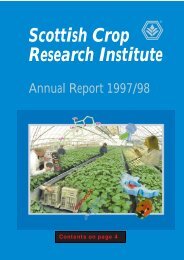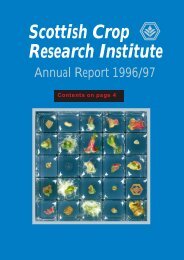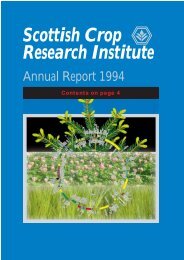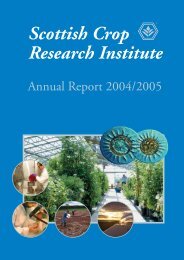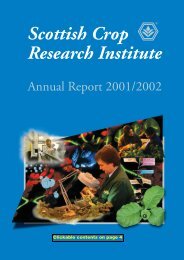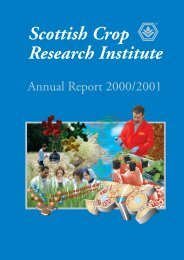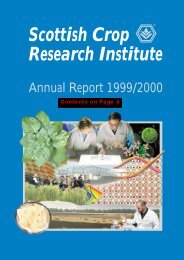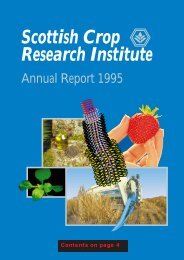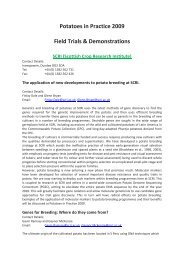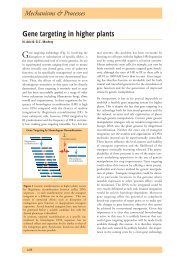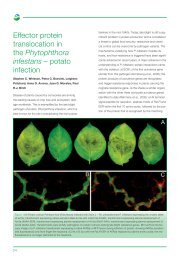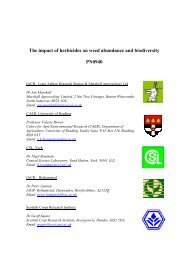PDF file: Annual Report 2002/2003 - Scottish Crop Research Institute
PDF file: Annual Report 2002/2003 - Scottish Crop Research Institute
PDF file: Annual Report 2002/2003 - Scottish Crop Research Institute
Create successful ePaper yourself
Turn your PDF publications into a flip-book with our unique Google optimized e-Paper software.
Director’s <strong>Report</strong><br />
economy proposed six guideposts to improve the globalisation<br />
process. (a) National policy agendas must<br />
recognise international interdependence. (b) National<br />
self-responsibility is an essential principle, as it is<br />
impossible to combat financial crises and poverty<br />
without better governance, a secure legal foundation,<br />
and less corruption. (c) Measurable and honest solidarity<br />
is required to combat world poverty, and the<br />
target set by the UN of 0.7% of GDP in development<br />
aid should be met. (d) National efforts and international<br />
cooperation need to be integrated to combat<br />
global ecological threats. (e) International standards<br />
and codes, promoting greater transparency, efficient<br />
financial market-supervision, and good corporate governance<br />
are needed for recognised ‘rules of the game’<br />
to participate fairly in globalisation. (f) There should<br />
be respect for the diversity of experiences and cultures,<br />
and all countries should not be focused into a uniform<br />
economic model<br />
Subsidies Subsidy arrangements in the USA and EU<br />
were elaborated during <strong>2002</strong>-<strong>2003</strong>. In the USA, legislation<br />
enacting supplemental farm spending up to<br />
2007, and multiyear legislation on countercycle farm<br />
support payments, represented substantial increases in<br />
subsidies. Further subsidy support would come from<br />
newly launched environmental protection programmes.<br />
In the EU, the mid-term review (MTR) of<br />
the Common Agricultural Policy (CAP) initially proposed<br />
cuts in subsidies and converting the remaining<br />
subsidies into production-neutral support linked to<br />
as-yet-undefined environmental objectives. This proposal<br />
was rejected in favour of the status quo for most<br />
EU countries, irrespective of strains that may arise<br />
with the accession of 10 states from Central Europe.<br />
OECD The OECD came into force in 1960 with the<br />
aim of promoting (a) policies design to achieve sustainable<br />
economic growth, employment, and financial<br />
stability in member countries; (b) sound economic<br />
development in member countries as well as LDCs;<br />
and (c) expansion of world trade on a multinational<br />
basis. The original member countries are Austria,<br />
Belgium, Canada, Denmark, France, Germany,<br />
Greece, Iceland, the Irish Republic, Italy,<br />
Luxembourg, The Netherlands, Norway, Portugal,<br />
Spain, Sweden, Switzerland, Turkey, UK, and the<br />
USA. Thereafter, ten other countries joined the<br />
OECD viz. Japan (1964), Finland (1969), Australia<br />
(1971), New Zealand (1973), Mexico (1994), Czech<br />
Republic (1995), Hungary (1996), Poland (1996),<br />
Korea (1996), and the Slovak Republic (2000).<br />
In the OECD Agricultural Outlook, <strong>2003</strong>-2008,<br />
Highlights, <strong>2003</strong>, prepared by the OECD Directorate<br />
for Food, Agriculture and Fisheries, a series of economic<br />
and policy assumptions, together with various<br />
commodity production projections were used to forecast<br />
how global and domestic forces shape agricultural<br />
markets over the short to medium term. As a result of<br />
population changes, global dietary changes, and economic<br />
growth changes, it was projected that the world<br />
production of agricultural products would continue to<br />
expand over the period to 2008, reflecting in large<br />
measure continued productivity increase, especially in<br />
non-OECD countries (the Non-Member Economies).<br />
There will be a shift in outputs from food grains such<br />
as wheat- and rice-based staple foods towards more<br />
processed foodstuffs and high-protein products, especially<br />
meats. OECD markets are thought to be capable<br />
only of relatively slow growth. In the short term,<br />
drought, low demand arising from the global economic<br />
weakness, and market distortion caused by governmental<br />
support policies (notably in the EU, Japan,<br />
and the USA) are leading to divergent price trends for<br />
higher crop prices and depressed livestock prices, but<br />
this trend will readjust as the global economy<br />
improves. Improvement in market conditions would<br />
occur if agreement could be reached in the WTO<br />
agricultural trade negotiations. For OECD countries,<br />
the highest growth in net trade will be for cereals,<br />
especially coarse grains, followed by dairy products,<br />
when compared with average volumes for 1997-2001.<br />
A slowdown in meat exports is expected as internal<br />
consumption increases and international competition<br />
takes effect. Low global sugar prices are expected over<br />
the medium term.<br />
UPOV In <strong>2003</strong>, Poland became the 24 th member<br />
state to deposit its instrument of accession to the 1991<br />
UPOV (International Convention for the Protection<br />
of new Varieties of Plants) agreement.<br />
GM and Organic <strong>Crop</strong>s As a result of health interests<br />
as well as food scares, livestock-related diseases, food<br />
poisoning, and the prospect of terrorist attacks, food<br />
quality, safety, and labelling were high-pro<strong>file</strong> issues<br />
through <strong>2002</strong>-<strong>2003</strong>. Genetically modified organisms<br />
(GMOs) and GM products were especially contentious,<br />
as the EU continued its opposition to the<br />
importation of GM foods until they were shown<br />
unequivocally to be safe for human health and the<br />
environment. It was stated that all GMOs in food<br />
must be listed by shippers, and that products containing<br />
more than 0.9% GM materials must be labelled as<br />
such. These obligations were linked to extensive<br />
39



